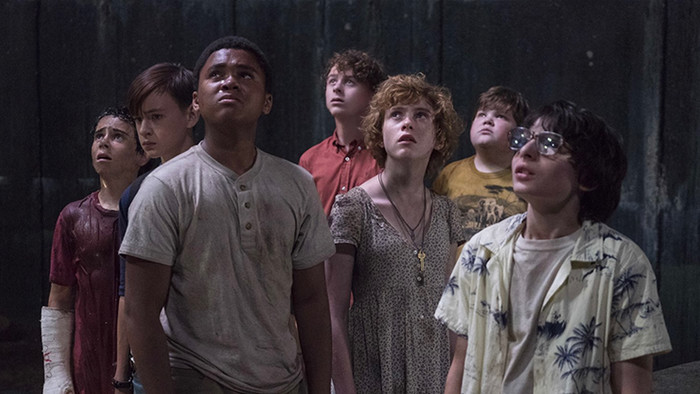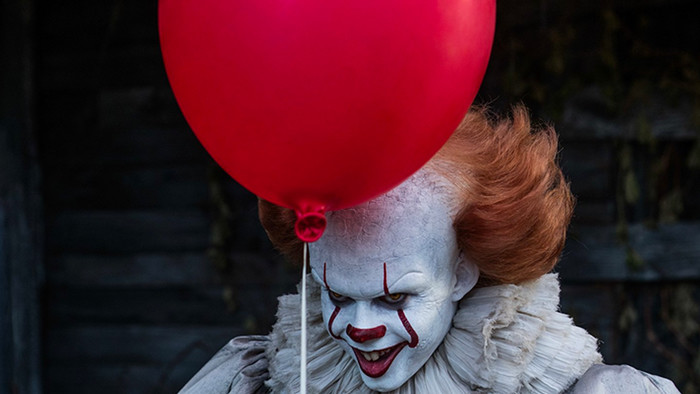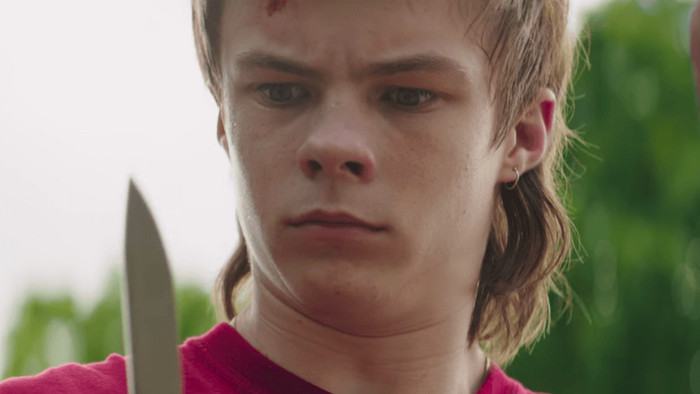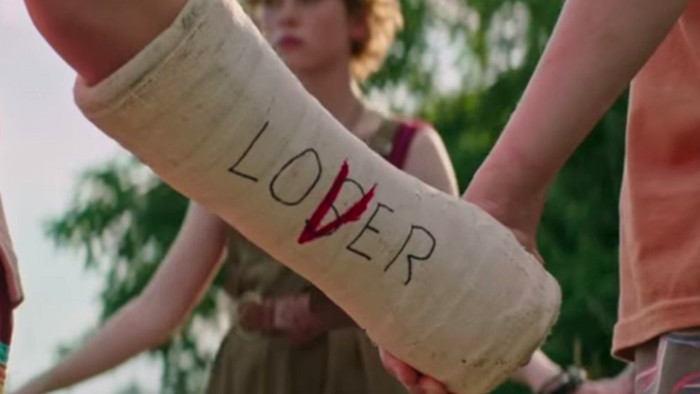'It' Spoiler Review: Long Live The Losers' Club
(In our Spoiler Reviews, we take a deep dive into a new release and get to the heart of what makes it tick...and every story point is up for discussion. In this entry: Andy Muschietti's It.)How do you make a good Stephen King adaptation? That's apparently a hard question to answer, since there are far more bad King film adaptations than good. More often than not, it seems filmmakers only latch onto the Stephen King brand – they figure if they make something that attempts to be scary and slap King's name on it, the audience will come. That's likely true, but the audience won't come back again.Last weekend, Andy Muschietti's big screen adaptation of Stephen King's It defied expectations – expectations that were already trending positively – and took in the largest opening weekend at the box office in horror movie history. This success isn't just the result of the King name brand – if it were, we'd still be talking about the Dark Tower film adaptation instead of consigning it to the dust. The success of It is the result of supremely positive word-of-mouth. The trailers were edited well enough to drum up buzz, and then early reviews were overwhelmingly positive. The hype just kept on building.And that's because the movie is good. And more than that, it's a good Stephen King adaptation.
The Losers' Club
The key ingredient to making a good Stephen King adaptation is to not just adapt King's talent for creating horror, but also to realize he excels at creating memorable, believable characters. "The job boils down to two things: paying attention to how the real people around you behave and then telling the truth about what you see," King said. "It's also important to remember that no one is 'the bad guy' or 'the best friend' or 'the whore with a heart of gold' in real life; in real life we each of us regard ourselves as the main character, the protagonist, the big cheese; the camera is on us , baby. If you can bring this attitude into your fiction, you may not find it easier to create brilliant characters, but it will be harder for you to create the sort of one-dimensional dopes that populate so much pop fiction."King instills quirks, and fears, and desires into his characters, both when he first introduces them and as the story is unfolding. Even minor characters who are destined for certain death are handled with love and care in King's hands. This is the ingredient that so many literary snobs seem to overlook when they look down on King as just a fad author of pop fiction. Yes, he writes incredibly pulpy stories, but he populates them with living, breathing people.Andy Muschietti's adaptation of It gets that. Muschietti and screenwriters Chase Palmer, Cary Fukunaga and Gary Dauberman realize that the best way to make an audience afraid for a character's well-being is to first make them care about that character.The 2017 adaptation of It could've botched this badly. For one thing, this is a big studio horror film, and studio horror tends to suck, for lack of a better word. Most great modern horror comes as the result of independent productions. A lesser film would've quickly nixed any real character development and gotten to the gory stuff. I can just picture in my head another, crappy version of this film where the evil Pennywise the Clown is in almost every scene and we barely know anything about the kids he's trying to kill.But It doesn't do that. It takes its time. One by one, it sets up the members of the Losers' Club. There's Bill (Jaeden Lieberher), unable to fully express himself due to a stutter and still reeling from the disappearance of his kid brother Georgie. Then there are Bill's friends – Eddie (Jack Dylan Grazer), the smallest member of the group – the one who might be the most frail due to his many ailments; Richie (Finn Wolfhard), the kid who thinks he's so hilarious that he can never shut up; and Stan (Wyatt Oleff), the neat and proper member of the group and the one torn between hanging with his friends and studying for his bar mitzvah.Then there are the outsiders who slowly find their way into the inner-circle of Bill and his friends. Lonely, overweight Ben (Jeremy Ray Taylor), who has been putting together a history of the town of Derry, Maine; home schooled Mike (Chosen Jacobs), who might be even more of an outcast than the others because he's one of the lone black faces in town; and Bev (Sophia Lillis), a tough-seeming girl who finds herself bullied by the mean girls at school and leered at by her abusive father.The early stages of It show us who all these kids are: we see Mike hesitating to kill an animal at the family farm where he works; Ben, alone in the library to avoid bullies; Bev, who cuts off her ponytail after her lecherous father pays too much attention to it; and most of all, we see Bill, struggling to come to terms with the potential death of his brother, Georgie.As far as Bill's friends and parents are concerned, Georgie is dead. He's dead just like all the other kids who have mysteriously gone missing in Derry are dead. But Bill holds out hope – Georgie's body was never found, so maybe, just maybe, he's still out there.Of course, he's not. As It opens, we learn the true tragic fate of Georgie. The boy goes out in the rain to sail a paper boat along the water running in the gutters. When the boat disappears down a sewer grate, it's rescued by the unlikeliest of sources – a clown, who is inexplicably lurking in the sewers. This clown is no circus performer, though – it's a monster that brutally butchers Georgie before feeding on him. With this disturbing opening scene, Muschietti is showing the audience he's not going to pull any punches. No one is safe here. And because the film takes the time to show us who these kids really are, we genuinely fear for their safety.
Pennywise Lives
The 2017 It is not the first time King's tome of terror was adapted for the screen. The first screen the book made its way onto, though, was the small rather than the large. In 1990, a miniseries adaptation of King's book traumatized an entire generation of children who would grow up with a fear of clowns.The It miniseries got down with the clown through the now iconic performance of Tim Curry. Curry slipped into Pennywise's baggy clown suit and proceeded to scare the ever-loving shit out of everyone. It's a great performance, and it's just about the only thing from the miniseries that really holds up.Curry's performance was full of gleeful menace – his Pennywise enjoyed what he did, like someone who is really good at their job and knows it. Anyone who took on the role for the new film would forever be in Curry's shadow, and Bill Skarsgård didn't exactly seem like the likely choice.Skarsgård's approach to the character is monumentally different than Curry's. The actor clearly set out to make the part his own, and he mostly succeeds. Skarsgård's Pennywise is almost glaringly inhuman. While Curry's killer clown could be seen as a monster trying to pass for human, Skarsgård's is a creature who doesn't have any idea how to even begin acting human. The actor adopts a truly strange speech pattern, his voice constantly fluctuating. It takes some getting used to.It's a very pronounced performance overall, and the showiness plays into Skarsgård's interpretation of the character – Pennywise is putting on an act. He's a performer, and his child victims are his audience.It wisely keeps Pennywise in the background. Like the shark from Jaws or the Joker from The Dark Knight, his presence is always felt, even when he's not around. Again, a lesser studio horror film might have insisted on more Pennywise since he's the most marketable character in the film, but Muschietti keeps him at bay.That said, some more background on Pennywise as an ever-present force of evil in town would've been welcomed. It mentions this aspect and plays it up a bit with a slideshow sequence that goes terribly wrong, but it's nowhere near as detailed as the novel. Earlier drafts of the script, back when Cary Fukunaga was set to direct, had more of this, but these elements have been excised for a more streamlined approach.Pennywise's appearances here are memorable, though not quite as memorable as the book, where he's constantly taking the form of movie monsters to frighten his victims. That's not to say the appearances here aren't frightening. One of the best sequences in It is the aforementioned slideshow sequence, where the Losers flash through images of Derry's history and learn that Pennywise has been there all along. Pennywise eventually finds his way into the images supernaturally, resulting in a moment where he comes popping out of the projector screen – and he's huge. We're talking the size of a school bus here. If you think clowns are creepy to begin with, seeing a giant clown will probably make you sleep with the lights on for a week.
Human Monsters
Pennywise may be the main antagonist of It, but he's not the only monster here. One of the film's best aspects is how it plays up how strange and threatening childhood can be, especially to children who feel displaced and alone."It's a secret world," King said of childhood. "It exists by its own rules and lives in its own culture. And the second thing is that we forget what it is to be a child, and we forget that life, which is kind of exotic and strange."In Derry, the adults live under a spell that makes them oblivious to Pennywise's existence. Even though children disappear at an alarming rate in the town, the town folk eventually move on from it all. They push the tragedies from their mind.The adults that the Losers' Club encounters are almost all terrible across the board. They're abusive, accusing people who want to domineer children rather than nurture them. The worst offender of all is Bev's father, played by Stephen Bogaert. The film has ratcheted up this character's repulsiveness – in the book, he's physically abusive, but any other intentions he has on Bev are only hinted. In the 2017 film, the character is an outright creep who more or less tries to flirt with his daughter.It's not just adults who are presented as corrupt here. Nicholas Hamilton plays Henry Bowers, an older bully who grows increasingly more violent and volatile. Bowers pals around with other bullies who may not be as bad as he is, but are still willing to go along with and support his cruelty.The message is clear: those with power – that is, adults, or people older and stronger than you – are easily corruptible and needlessly cruel. When you're a kid, you are almost a non-entity; an individual with no real rights and no real say in how your life plays out. Perhaps the only way to survive in such a situation is to surround yourself with friends you care about; friends who will have your back.
People Who Build Houses In Your Heart
The best thing about It isn't the horror, and it isn't the casting (although that's pretty great too), and it isn't Pennywise – it's the how emotional the film ends up being. It doesn't lay its emotion on thick, but it's always there. The sense that these kids have each other, and that the only way they can triumph over It is to stay together.The film keeps playing up the emotional bond between the characters: after Ben is brutally attacked by Henry Bowers, Bill, Eddie and Stan band together to help bandage his wounds; on the last day of school, Bev is kind enough to strike-up a conversation with the lonely Ben. Little moments like this might've ended up in the editor's desktop trash can on a lesser film, but here, they add much-needed color.At the film's conclusion, the Losers have come to battle Pennywise in his underground lair. They've also come to rescue Bev, which is one of the film's biggest blunders. Bev is one of the toughest, bravest members of the the Losers' Club, and she remains that way through the entire film – and then the last half-hour completely robs her of her strength.For some reason, Muschietti and company decided to turn Bev into a damsel in distress, and that's a move that just doesn't sit right. Pennywise takes Bev prisoner in order to lure the rest of the Losers into the sewer, but the Losers didn't need that motivation. They already had a motivation: to kill Pennywise once and for all and end his reign of terror.Once the group is all together again, though, the real strength of their friendship becomes clear. Together, they're able to defeat Pennywise – something no one else has been able to do for hundreds and hundreds of years.As It concludes, the Losers' Club gathers by the river and vows to return again to stop Pennywise should he (or rather, It) ever return. And then one-by-one they part ways. Stan is the first to go, which is somewhat bittersweet if you're familiar with his fate as an adult. But little by little, the friends depart, and we get a sense that this will be the last time they see each other for a while. It's sad yet touching. Bev and Bill are the only two left together in the final minutes, awkward in their puppy love attraction to each other."I never felt like I was a loser with you," Bev tells Bill, and that's the line that rings truest in the entire film. These kids may have been outcasts – nerds, geeks, freaks, losers. But they had each other, and that's a lot more than some other people have. It recalls the best passage in King's book: "Maybe there aren't any such things as good friends or bad friends – maybe there are just friends, people who stand by you when you're hurt and who help you feel not so lonely. Maybe they're always worth being scared for, and hoping for, and living for. Maybe worth dying for too, if that's what has to be. No good friends. No bad friends. Only people you want, need to be with; people who build their houses in your heart."Only time will tell if the It sequel can capture the same sort of magic that the 2017 film did. It's worth noting that the second part of the 1990 miniseries, which featured the Losers as adults, is a lot less beloved than the first half. But Muschietti and his team might be able to pull it off. They've already proven they can do what so many others can't: make a good Stephen King adaptation.
